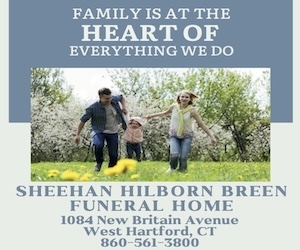
By Cindy Mindell
It has been 35 years since Jews from the former Soviet Union began leaving their homelands en masse to seek freedom of religion and a better life in Israel and North America.
Israel and North America.
Connecticut saw its first few arrivals in the late ‘70s and, with the help of Jewish communities throughout the state, helped to resettle and acculturate hundreds of families by the early 2000s (even after the dismantling of the Soviet Union in 1991, Jews continued to immigrate, though at a slower pace).
to immigrate, though at a slower pace).
As is the story with so many immigrant populations, those Soviet Jews who came as children or were born here to immigrants are now grown and fully acculturated. But many came as older adults and, imprisoned by a language barrier, were never fully acculturated.

Russian Jewish World War II vets at the 2013 community Yom Hashoah Commemoration, held at The Emanuel Synagogue in West Hartford.
“Many members of the older generation had more trouble acculturating and many never really felt fully fluent in English,” says Joan Margolis, director of Operations and Community Programs at Jewish Family Services of Greater Hartford and state coordinator of Programs for Holocaust Survivors. “So when they talk about things going on with them and want to speak from the heart, they talk in Russian.”
at Jewish Family Services of Greater Hartford and state coordinator of Programs for Holocaust Survivors. “So when they talk about things going on with them and want to speak from the heart, they talk in Russian.”
To help bridge the gap for this population – many of whom are now in their 80s, 90s — Jewish organizations and continuing to provide services and programming for them as they age and their children move away.
to provide services and programming for them as they age and their children move away.
At the Mandell JCC in West Hartford, for example, a unique group of 75 Russian Jewish World War II veterans have met regularly for social and educational activities since they arrived. The men and women were active as soldiers, doctors, and nurses in the battles of Kursk and Stalingrad; two of the women survived the Siege of Leningrad, and others survived ghettos as children.
in the battles of Kursk and Stalingrad; two of the women survived the Siege of Leningrad, and others survived ghettos as children.
At a May 6 event hosted by the Mandell JCC at Congregation Beth Israel in West Hartford, these veterans will receive special medals commemorating the “70th Anniversary of Victory in the Great Patriotic War of 1941-1945,” created in Russia and delivered earlier by a representative of the Consulate General of the Russian Federation in New York, on behalf of Russian president Vladimir Putin. This is the second time the veterans are being honored by the Russian government: in 1995, the Consul General of the Russian Federation in New York came to the JCC to present medals commemorating the 50th anniversary of the victory.
The actual anniversary – April 25 – is also known as Elbe Day, when American and Soviet troops met at the River Elbe near Torgau, eastern Germany, effectively dividing the country in two. The “Spirit of the Elbe” memorial was opened at Arlington Cemetery in 1995 to mark the 50th anniversary of the historic event. Some 5,000 of the commemorative medals are being presented by diplomats to former Soviet World War II veterans now living in the U.S., most of them in the Northeast. Thousands more have been distributed to veterans in Russia, and 32 were recently presented to Chinese veterans who fought with the Soviet army.
at Arlington Cemetery in 1995 to mark the 50th anniversary of the historic event. Some 5,000 of the commemorative medals are being presented by diplomats to former Soviet World War II veterans now living in the U.S., most of them in the Northeast. Thousands more have been distributed to veterans in Russia, and 32 were recently presented to Chinese veterans who fought with the Soviet army.

Lucy Dratva, program director of the New American Seniors group at the Mandell JCC (second from right), with Russian Jewish seniors at their Purim party.
director of the New American Seniors group at the Mandell JCC (second from right), with Russian Jewish seniors at their Purim party.
The Mandell JCC group was launched in 1992 as the Association of World War II Veterans and is now known as New American Seniors, funded in part by the Jewish Federation of Greater Hartford and coordinated by Odessa native Lucy Dratva. Starting with 22 original members, the group grew to 120 men and women at its peak, and now numbers 75.
75.
An economist in Ukraine who was fired when she announced her intention to emigrate, Dratva came to the U.S. with her parents, sister, then-husband, and son in October 1982. The family was sponsored by Dratva’s older sister, who had immigrated to Waterbury in 1979.
“Our main goal was to leave Russia to have religious freedom because we couldn’t practice Judaism in Ukraine,” says Dratva, outlining a common reality for Soviet Jews. “My son wanted to know who he is, his real identity, and to be a Jew, and that’s why we tried to leave the country – for his sake and to give him a future in the United States.”
By summer 1983, Dratva was working at the Mandell JCC – then called the Greater Hartford Jewish Community Center — aided by Jewish Family Services of Greater Hartford. Today, in addition to her position as coordinator of the New American Seniors group, she is also the recreation director for adult daycare at Juniper House Healthcare in West Hartford.
in West Hartford.
Unlike most Jews who fled Russian pogroms in the late 19th and early 20th centuries and didn’t look back, Dratva and the seniors she works with still carry nostalgia for their motherland.
“It’s your homeland, no matter how tough it may have been to survive as a Jew,” she says. “Odessa is a resort town by the Black Sea so it’s very beautiful, with historic buildings and streets and a theater and culture, so if you forget about politics, it’s beautiful. Antisemitism was a bad thing, but if you forget about that part of life and look at it in a different way, you remember your childhood, your school and teachers, the opera house, beautiful food – what people do everywhere when they think about their homeland.”
homeland, no matter how tough it may have been to survive as a Jew,” she says. “Odessa is a resort town by the Black Sea so it’s very beautiful, with historic buildings and streets and a theater and culture, so if you forget about politics, it’s beautiful. Antisemitism was a bad thing, but if you forget about that part of life and look at it in a different way, you remember your childhood, your school and teachers, the opera house, beautiful food – what people do everywhere when they think about their homeland.”
Likewise, says Dratva, the members of the New American Seniors group lived the bulk of their lives in the Soviet Union and, as such, it is the place that evokes their most salient memories.
“World War II is very vivid for them; they still remember what happened in each episode during the war,” Dratva says. “Russia lost 27 million people so this is very painful and also has some happy memories because there eventually was a victory. They remember how their children grew up, their work as doctors, nurses , teachers, bookkeepers, machine operators – the memories that keep them going and keep them alive. They’re also very happy in the dUnited States because they live in good housing, they have citizenship and benefits, they live longer, everybody respects them and takes care of them nicely.”
, teachers, bookkeepers, machine operators – the memories that keep them going and keep them alive. They’re also very happy in the dUnited States because they live in good housing, they have citizenship and benefits, they live longer, everybody respects them and takes care of them nicely.”
For many, however, English remains a challenge. “Some of them learned English, some didn’t,” says Dratva. “The adjustment can be difficult because of nostalgia, age, embarrassment to speak incorrectly . For some people, it’s very tough.”
. For some people, it’s very tough.”
When the newcomers arrived, they were welcomed and helped not only by the JCC, which provided programming for all ages and scholarships for kids’ programs, but also by Congregation Beth Israel, located on Farmington Avenue, in the neighborhood where most of the émigrés found housing.
for kids’ programs, but also by Congregation Beth Israel, located on Farmington Avenue, in the neighborhood where most of the émigrés found housing.
The synagogue formed the New American Committee, providing the Russians with English and citizenship classes, and with material assistance. Many second-generation newcomers went through the shul’s religious school, celebrated b’nai mitzvah and Confirmation and were married on the bimah in its sanctuary. Today, many of those new families are members of the congregation, while their elders continue to engage in cultural and educational activities at the synagogue, assisted by the still-active New American Committee.
activities at the synagogue, assisted by the still-active New American Committee.
Dratva runs several informal education classes at the JCC for the group, in Russian, as well as Friday afternoon pre-Shabbat meetings, alternating between the two apartment complexes where most of the seniors live – the A.E. Plant Building on Farmington Avenue and Federation Square on Starkel Road. She also serves as a translator for questions that come up during medical and social-services appointments, or when a senior has trouble understanding a bill or letter. The JCC has held information sessions for the New American Seniors on topics such as changes to Medicare and Medicaid. Once a month, the seniors gather at Beth Israel for the “Jewish Trivia” educational program led by Rabbi Michael Pincus.
led by Rabbi Michael Pincus.
In addition to West Hartford, the Jewish communities of Bridgeport, Greenwich, New Haven, New London, and Stamford also helped to resettle Soviet and Russian Jews, providing a range of material, educational , and human service-related assistance. In most communities, some services remain.
, and human service-related assistance. In most communities, some services remain.
For example, the Jewish Federation of Eastern Connecticut, Jewish Family Service in Fairfield, and Jewish Family Service in Stamford provide Russian Jews – now mostly elderly – with food baskets during their annual Jewish holiday food drives. In Greenwich, Jewish Family Services helps resettled Russian Jews with paperwork related to immigration matters – for example, if a family wants to sponsor relatives from the former Soviet Union, or apply to take the U.S. citizenship test. “We don’t have a resettlement program anymore and the families are already well-established, but sometimes they will call with a question,” says JFS administrator Tatiana Nichiforova, a native of Moldova.
to take the U.S. citizenship test. “We don’t have a resettlement program anymore and the families are already well-established, but sometimes they will call with a question,” says JFS administrator Tatiana Nichiforova, a native of Moldova.

In 2010, the American-born children and grandchildren of Russian Jewish immigrants participated in the New American Acculturation Program’s Purim shpiel at the JCC of Greater New Haven. The program’s coordinator, Yelena Gerovich, is back row, center.
The Greater New Haven community helped settle some 30 Soviet Jewish refugee families starting in the late ‘80s, helped by the Jewish Federation and Congregation Mishkan Israel in Hamden. In 2000, the communal focus – now spearheaded by the Jewish Federation of Greater New Haven – shifted to a New American Acculturation program.
“You move to a different country and have no idea what to do,” says coordinator Yelena Gerovich, who immigrated from Moscow in 1993 and began volunteering at the JCC a few months later, when the new building opened in Woodbridge. A music teacher by profession, she received a scholarship from the Federation to earn a Master’s degree in social work from Southern Connecticut State University in 2000, and returned to head up the acculturation program.
from the Federation to earn a Master’s degree in social work from Southern Connecticut State University in 2000, and returned to head up the acculturation program.
“The refugee program was to help with furniture, food, medical services, paying bills, applying for assistance from the state,” she says. “The acculturation program helps people understand where they are and what they have to do. When we started 15 years ago, there were all kinds of problems. If someone called for help with their taxes, I asked an accountant in the community to do a program for the Russians. A parent would call me and say, ‘My son is in high school and I don’t know what SATs are or how to apply to colleges,’ so I would get someone to explain to the group in Russian or I would translate the English explanation. For our people who lost their jobs and needed to figure out how to get benefits from the State, I would explain how to fill out
was to help with furniture, food, medical services, paying bills, applying for assistance from the state,” she says. “The acculturation program helps people understand where they are and what they have to do. When we started 15 years ago, there were all kinds of problems. If someone called for help with their taxes, I asked an accountant in the community to do a program for the Russians. A parent would call me and say, ‘My son is in high school and I don’t know what SATs are or how to apply to colleges,’ so I would get someone to explain to the group in Russian or I would translate the English explanation. For our people who lost their jobs and needed to figure out how to get benefits from the State, I would explain how to fill out applications.”
applications.”
The acculturation program, held at the JCC of Greater New Haven and area synagogues, offered activities for all ages. “But the big part was Jewish identity,” Gerovich says. “You can teach people once how to do taxes and college applications and to write a check , but Jewish life is a long-term story.”
, but Jewish life is a long-term story.”
Alongside classes in English and citizenship were Jewish education programs and a Russian-language theater program for kids, with plays based on the Jewish holidays. A few years ago, as a sort of reunion, Gerovich invited the children – born in the U.S. after their parents and grandparents had arrived here, and now all grown – to participate in a Purim shpiel. The adult children don’t speak Russian anymore, but agreed to memorize some lines to please their older relatives.
and a Russian-language theater program for kids, with plays based on the Jewish holidays. A few years ago, as a sort of reunion, Gerovich invited the children – born in the U.S. after their parents and grandparents had arrived here, and now all grown – to participate in a Purim shpiel. The adult children don’t speak Russian anymore, but agreed to memorize some lines to please their older relatives.
Now the acculturation group serves those seniors, some 80 members in all, 50 of them active and the rest too frail to attend more than two or three events a year. There are 15 or so World War II veterans among them. The program is open to the entire Russian-speaking community, but most of the participants are Jewish, Gerovich says. Every year, Putin has sent a letter thanking the veterans from Russia proper; Gorevich hasn’t seen similar letters from the leaders of former Soviet Union countries. The acculturation group will honor the veterans on May 8.
Funding for the largest Jewish populations from the former Soviet Union served by Jewish Federations in Connecticut – Greenwich, Greater Hartford, and Greater New Haven – comes in part from State of Connecticut grants secured and administered by JFACT (Jewish Federation Association of Connecticut). Last year, the organization was awarded two two-year State grants to help this aging population: Social and Employment Services for Russian Jewish Refugees, and Elderly Services for Russian Jewish Refugees.
and administered by JFACT (Jewish Federation Association of Connecticut). Last year, the organization was awarded two two-year State grants to help this aging population: Social and Employment Services for Russian Jewish Refugees, and Elderly Services for Russian Jewish Refugees.
Jewish communities were eager to help the new immigrants when they arrived, and now, they must tend to Russian-Jewish elders as they age and near the end of life. At JFS-Hartford, Russian-born social worker Svetlana Berlinsky offers behavioral health support to the older generation of Russian immigrants who can best express themselves in their native language. Berlinsky is the third bilingual social worker on staff, replacing two predecessors who retired over the last three years.
“When we work with Holocaust survivors, we say that Jewish Family Services will act as your last surviving relative,” says Margolis. “‘Family’ is our middle name, so if you have many family members or no one else, there are those who like to think of us in that way. So too, for the older adults born in the former Soviet Union: we will see you to the end.”
last surviving relative,” says Margolis. “‘Family’ is our middle name, so if you have many family members or no one else, there are those who like to think of us in that way. So too, for the older adults born in the former Soviet Union: we will see you to the end.”
CAP: A Russian Jewish woman lights candles at a New American Chanukah party held at the Mandell JCC.








 Southern New England Jewish Ledger
Southern New England Jewish Ledger








